Hong Kong to Shanghai
HARD SLEEPER TRAIN, CHINA
APRIL 11-12
The "hard sleeper" train from Hong Kong to Shanghai turned out to be a
six-berth compartment with lightly (and I stress "lightly") padded bunks. Mine
was the top berth. I had a foot and a half between my head and the ceiling, but
well over seven feet between myself and the floor. But I was lucky to have a
bunk at all, since the trains were sold out for the Easter holiday.
"Why don't you take the plane?" asked the well-intentioned agent at
Hong Kong's Phoenix Travel. "If you take the train, you will be traveling for
26 hours. If you take the plane, you will travel for one or two hours."
I'd lied and said that I couldn't afford the plane. I had given up
trying to explain to people that I couldn't take airplanes for the sake of a
website.
I had inadvertantly kicked a nice Hong Kong woman in the face while
trying to get my bag up to the top bunk. I didn't regret it later when she and
her traveling companions brought out their mahjong tiles. They invited others
into the cabin, and the marathon mahjong game began. I took my book and pulled
down a jumpseat in the hall, while vendors and attendants squeezed around me. I
would've been hopelessly morose without the copy of "Catch-22" that I'd picked
up way back in Singapore.
There was no smoking or spitting yet. I'd been warned by countless
China-travel veterans that the Chinese were always spitting or smoking. Hong
Kong must be different, I reasoned. All my cabinmates were guilty of was
playing mahjong and talking at top volume, as if the person next to them were a
car away.
We went through Customs at the Chinese border and a Japanese couple's
food was stolen while we were off the train. Sadly, the mahjong tiles were left
intact.
My food wasn't stolen, so I forlornly ate my turkey and avocado on
baguette, and read until it seemed like a suitable time for bed. I climbed the
three stories to my bunk, where I lay under the glaring overhead light and
listened to the wild gaming party going on seven feet below. A man lay on the
berth just across from me, pretending to sleep. I spotted him glaring at those
below and we shared a chuckle. I am a skilled sleeper, and it wasn't long
before I managed to sleep in spite of the raucous fun below.
I tried to lie in, and managed to feign sleep until nine a.m., when I
could no longer ignore the swirling and clicking of the mahjong pieces below.
Forcing myself down the bunk triplex and back into my hallway jumpseat, I
started in on instant Nescafe, a muffin, and the remainder of "Catch-22."
What a difference a few months had made! When I'd taken my first
overnight train, Amtrak's "Lakeshore Limited," I'd been dazed and exhausted,
drained from selling my apartment, working, and planning. I'd stared alone into
the night for hours, not even opening my book. Now I shared a compartment with
five strangers, and smiled my way through language barriers when I wasn't
kicking people in the face or dropping my backpack on their gameboard.
When I finished "Catch-22," I headed to the dining car. The staff
ignored me for a while and then brought me some rice and chicken. I read the
spy plane "Newsweek" I'd picked up in Hong Kong.
I'd been following the "spy plane" news in the "China Daily," and
couldn't take it seriously. The paper was obviously propaganda, and at one
point went so far as to print a cut-and-paste photo of Fidel Castro at a
current rally in support of his Communist brothers in China. Castro looked
about 20 years younger than he currently does, and the scan of Castro was much
lighter than the surrounding photo.
According to the "China Daily," the U.S. spy plane had illegally
invaded Chinese airspace and then rammed a Chinese fighter jet. The U.S. plane
then proceeded to land in China without permission, and no one in the U.S. even
cared that the Chinese pilot was missing.
I had tried to track down info on CNN.com, BBC's website, and on the
Associated Press site from China, but all were blocked in mainland China. So,
in fact, was MariesWorldTour.com, but I don't think the two items were related.
No one in Yangshuo had seemed to know or care about the spy plane. Could they be so used to propaganda that they ignored it? Or were they just
being polite to me, and not bringing up a sore subject?
Hong Kong had been different, however. The spy plane was big news
there, and businessmen stopped on the street when news came on the giant
television near the Star Ferry. In Hong Kong, news came from both Chinese and
Western media. I couldn't tell what the average Hong Kong person thought of the
whole affair, but they were clearly very concerned.
And rightly so. Hong Kong occupies a unique place in world affairs.
It's caught between China and the West, and has a vested financial interest in
the continuance of trade between the two.
I studied the "Newsweek" point of view. The U.S. plane had rammed the
fighter jet, in much the same way that I once rammed a deer that leapt over the
Route 70 guardrail and into the fender of my '71 Volvo. Hopefully, this would
all blow over and not affect me on a personal level.
SHANGHAI
APRIL 12
The Shanghai YMCA had the sort of beautiful setup that every budget
traveler dreams of. The dorms were enormous, the beds comfy, and only four same-
gender travelers shared one room. I was given my own locking cabinent, and a
free breakfast coupon, all for fifteen dollars a night. The 'Y' was centrally
located, near the People's Park, the Bund, the subway, and Starbucks morning
coffee. What more could I ask for (besides Starbucks improving their bitter
coffee, that is)?
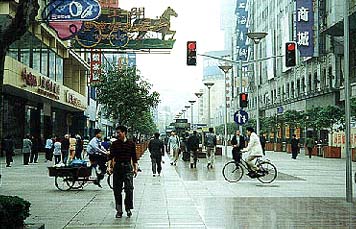 Bright lights, big city.
Bright lights, big city.
I walked around, passing department stores, McDonald's, Bennetton, KFC,
and fashionable women dressed in black platform shoes. Kids bore knapsacks
featuring Donald Duck zipper-pullers. I would forget that I was in Shanghai as
I headed towards the easy-to-use subway, but then some small oddity would
remind me that I was in China -- a man would be selling bunnies in wire cages
on a street corner, for example, or I'd look up and see the heavy smog that
blanketed the city. I relaxed and lived a city life, just for a few days.
APRIL 13
I was drinking a slightly bitter medium Caffe Americano when an
American man joined me at Starbucks.
Mark turned out to be a grumpy writer disguised as a friendly tourist,
just like me. We arranged to meet for dinner later, and I wandered around
Shanghai some more.
Initially, I'd thought it very similar to New York, but as I looked
closer, I began to notice not-very-subtle differences.
There were pedestrian overpasses and underpasses, a very civilized
approach to the coexistence of people and autos. Unfortunately, only about half
the people used the pedestrian bypasses, the rest walking directly into
traffic. Sometimes this had the desired effect of bringing traffic to a dead
half, but usually everyone -- and every car -- just squeezed through.
The people of Shanghai used the same approach when walking on the sidewalk. They'd blaze a path, regardless of others. They didn't glare or
appear intimidating -- they just didn't seem to have worked out that it is a
good idea to move to let others through.
There were also no rebel fashions, and everyone had a cellphone. No one
waited in line at the subway -- they all barged onto the trains without letting
anyone in the cars get out.
And still, I saw none of the world-famous Chinese spitting.
Dinner with Mark turned out to be on what I instantly dubbed "appalling
disco street." Ultra-hip bars and restaurants convinced me once and for all
that all of my preconceptions about China were useless, that communist China
was not at all what I'd expected.
Mark met a Chinese man a day later, and e-mailed me to say that the
China we had expected to see did still exist. The Chinese man lived with his
wife in an apartment built for two, but inhabited by six. The man had not left
China when the Cultural Revolution started, and had been sent to work at hard
labor for many years in the countryside. His son had suffered the same fate.
All because of one small decision to not bolt for Hong Kong when he'd had the
chance.
APRIL 14
My friend from home, Yancey, was due in at the airport. We were both
joining a two-week "Intrepid" trip that would cover Shanghai to Beijing. Our group consisted of twelve travelers and a
leader, and I had met the group already back in Yangshuo.
Intrepid's hotel, the "Nanjing," was $50, so I paid the 'Y' another $15
and decided to stay there for one more night. I'd move to the Nanjing in the
morning when it was paid for.
Yancey showed up, and I met him in the Nanjing lobby.
"You paid for a night at the YMCA?" he asked, showing me a voucher with both our names on it. "But you already paid for a night here!"
Shit. I'd had a lot on my mind lately.
It was late, and we were hungry. Nothing was open, and Appalling Disco
Street was far away. We went to McDonald's (noting that Egg McMuffins were
served on buns in China) and grabbed quickie burgers.
Yancey made the faux pas of throwing his trash into the trashcan. Asian
McDonald's have employees who do this, and Americans, used to clearing their
own tables, are always confused. Yancey got his just desserts, however, when he
got his finger mired in a spot of ketchup that lingered on the trashcan lid.
He went to the counter, waving around his red finger while he asked for
a napkin.
"Ketchup?" said the cashier, brightly. She handed him an unopened
pack.
"Sure," he said, and found somewhere else to wipe his finger.
APRIL 15
I left my beloved YMCA behind me and checked into the Nanjing. Intrepid
had assigned me a single room for the duration of the trip, due to the odd
number of men and women along. Yancey would be sharing his room with an
Australian named Michael.
We met our leader Rob. It would be his job to book transportation and
get us to hotels every night. I could sit back and go along for the ride, but
was apprehensive about my ability to play nicely with others after so much
independent travel.
Rob was a reformed capitalist. He reminded me of a reformed smoker, the
kind who hates smoking with a passion. He had been a successful salesperson in
Canada, and claimed to have been a close-minded, bigoted materialist. A
business trip to an impoverished part of Mexico had changed all that, and now
he was out to help the world by engendering greater cultural understanding, or
by any means within his grasp.
 Small bill.
Small bill.
Yancey, like me when I first left home, was exhausted from working. He
was feeling sluggish, so we thought we'd take a tour bus around the city just
to get our bearings.
We waited for the bus for an hour. We'd asked at a tourist information
office and at an airline office, and both had assured us that the bus would
come at the appointed time. It never came. We sat on the curb in the sunshine
(as much as it could poke through the Shanghai smog) and ate Easter jellybeans,
that Yancey had thought to bring along. It wasn't too bad for an Easter dinner.
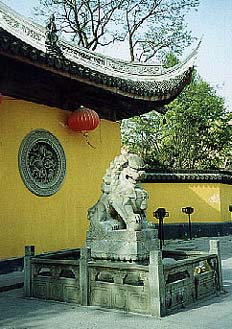 Longhua Temple.
Longhua Temple.
Stuffed with Jelly Bellys, we took the subway to a taxi to Longhua
Temple (where a nearby statue strongly resembled the "Superfriends"), and then
found a small restaurant where we gambled and asked for the specialty of the
house. We were served a complete chicken, cut into little bony slices and
covered in lemon juice. It was difficult to eat around the bones, but we had
eaten enough jelly beans that it didn't really matter.
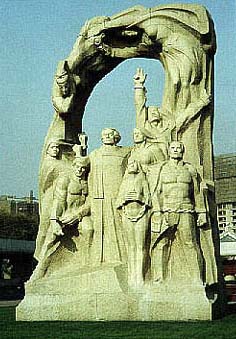 Superfriends?
Superfriends?
Finally, we strolled along the Bund, Shanghai's old waterfront. The
European buildings were dramatically lit, and Chinese tourists mobbed the
length of the boardwalk. Vendors sold gel lightsticks, photos, and postcards,
and focused on the Chinese tourists instead of on us. The begging children were
not so kind, however, and aggresively ambushed us as soon as we walked onto the
pedestrian overpass. I now understood why pedestrians risked the streets.
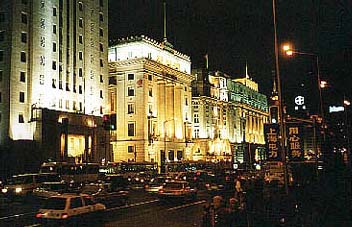 The Bund.
The Bund.
APRIL 16
After a highbrow morning of perusing the art at the Shanghai Museum,
Yancey and I opted for some lowbrow culture.
"Ancient Chinese secret" took on a whole new meaning at the "Museum of Ancient Chinese Sex Culture," located just upstairs from the Subway sandwich shop.
Sex education in China used to consist of parents putting ceramic
figures or paintings of couples "getting busy" (as Yancey put it) into a
wedding chest. The newlywed couples would, in theory, open the chests on their
wedding nights, and instead of staring at the Franklin Mint-esque figures in
confusion, the couples would attempt to imitate the poses they were presented
with.
Obviously this worked, as China is the most populous nation on earth.
A fellow named Dr. Liu Dalin collected various sex education figures
and paintings, along with erotic Chinese sculpture and tools that were used to
sexually oppress women (binding feet shoes, torture instruments, etc.) and put
them on display above Subway. As Emma, one of our Intrepid co-travelers put it,
there weren't any surprises but it was very interesting!
Later, we headed to the Lyceum Theater to watch acrobats as they
twirled plates, balanced on pyramids of chairs and each other, and rode
unicycles while tossing bowls on their heads. My favorite was the hat dance, in
which about seven men in tank tops and tights ran around tossing hats in the
air and catching them on their heads. It really was more impressive than it
sounds, but I couldn't help wondering "who conceived this ridiculous dance?"
The women were all amazing contortionists, and the men were all incredibly
strong.
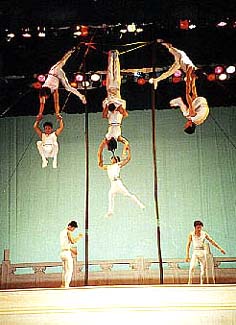 Lyceum Theater Chinese Acrobats.
Lyceum Theater Chinese Acrobats.
"I think I've just spotted my future wife," said Yancey.
"I'm going to take them all home on a chartered plane," declared
Michael. He was Yancey's future roommate, but we'd just met him at the Lyceum
for the first time.
Michael was a 40-year-old Australian kindergarten teacher who lived in
a house he'd built himself on 30-acres of rainforest near Brisbane. He was
chronicling his trip on sheets of paper stolen from hotels, and had studied the
Public Security Bureau's hotel rules carefully. He kept us amused constantly
with his observations of the mundane in China.
"I've just read the PSB Hotel Rules and I've learned that I'm not allowed to up
anyone for the night. Amongst other rules are these gems:
- Not to conduct unsnairy activities.
- No farm animals in my room.
- No lighting fires or letting off firecracker in my room.
- No dangerous or radioactive articles allowed in my room.
- No drinking and making great noises.
At the bottom of these rules, it says that if I violate them, I'll be punished
by PSB organ."
After meeting Michael and listening to his travelogue, my apprehensions
about traveling with a group evaporated. This was going to be fun.
NEXT: Zhouzhang, Suzhou, and fried bugs (yum!).